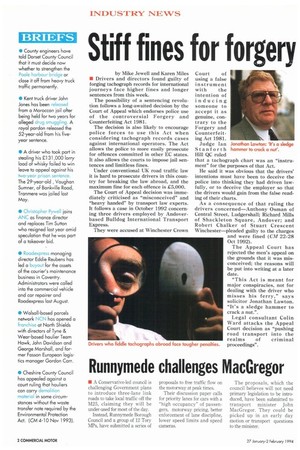Stiff fines for forgery
Page 4

If you've noticed an error in this article please click here to report it so we can fix it.
by Mike Jewell and Karen Miles • Drivers and directors found guilty of forging tachograph records for international journeys face higher fines and longer sentences from this week.
The possibility of a sentencing revolution follows a long-awaited decision by the Court of Appeal which endorses police use of the controversial Forgery and Counterfeiting Act 1981.
The decision is also likely to encourage police forces to use this Act when considering tachograph records cases against international operators. The Act allows the police to more easily prosecute for offences committed in other EC states. It also allows the courts to impose jail sentences and limitless fines.
Under conventional UK road traffic law it is hard to prosecute drivers in this country for breaking the law abroad, and the maximum fine for each offence is £5,000.
The Court of Appeal decision was immediately criticised as "misconceived" and "heavy handed" by transport law experts. It follows a case in October 1992 concerning three drivers employed by Andoverbased Bulldog International Transport Express.
They were accused at Winchester Crown Court of using a false instrument with the intention of inducing someone to accept it as genuine, contrary to the Forgery and Counterfeiting Act 1981.
Judge Ian Stanforth Hill QC ruled that a tachograph chart was an "instrument" for the purposes of that Act.
He said it was obvious that the drivers' intentions must have been to deceive the police into thinking they had driven lawfully, or to deceive the employer so that the drivers would gain from the false reading of their charts.
As a consequence of that ruling the drivers concerned—Anthony Osman of Central Street, Ltulgershall; Richard Mills of Shackleton Square, Andover; and Robert Chalker of Stuart Crescent Winchester—pleaded guilty to the charges and were fined (CM 22-28 Oct 1992). Jonathan Lawton: 'It's a sledge hammer to crack a nut'.
The Appeal Court has rejected the men's appeal on the grounds that it was misconceived; the reasons will be put into writing at a later date.
"This Act is meant for major conspiracies, not for dealing with the driver who misses his ferry," says solicitor Jonathan Lawton. "It's a sledge hammer to crack a nut.".
Legal consultant Colin Ward attacks the Appeal Court decision as "pushing road transport into the realms of criminal face tougher penalties. proceedings".




















































































